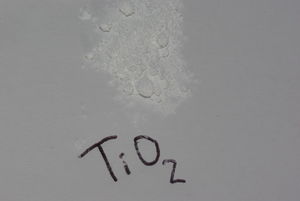Difference between revisions of "Titanium dioxide"
(→Chemical) |
Diachrynic (Talk | contribs) |
||
| Line 109: | Line 109: | ||
}} | }} | ||
}} | }} | ||
| − | '''Titanium dioxide''', systematically '''titanium(IV) oxide,''' is a white, rather nonreactive oxide containing [[titanium]] in the +4 oxidation state. It is by far the most commonly encountered titanium compound, as it has multiple industrial uses. Many of these uses are to do with its colour (or lack thereof); it is used in both white paint, sunscreen and white icing, among other things. It has the chemical formula '''TiO<sub>2</sub>'''. In nature it is found as mineral '''rutile'''. | + | '''Titanium dioxide''', systematically '''titanium(IV) oxide,''' is a white, rather nonreactive oxide containing [[titanium]] in the +4 oxidation state. It is by far the most commonly encountered titanium compound, as it has multiple industrial uses. Many of these uses are to do with its colour (or lack thereof); it is used in both white paint, sunscreen and white icing, among other things. It has the chemical formula '''TiO<sub>2</sub>'''. In nature it is found as mineral '''rutile''' or as '''anatase'''. |
== Properties == | == Properties == | ||
===Physical=== | ===Physical=== | ||
Titanium dioxide is a white, insoluble solid with a melting point of around 1830°C.<ref>CRC Handbook of Chemistry and Physics, 66th Edition, 1985</ref> | Titanium dioxide is a white, insoluble solid with a melting point of around 1830°C.<ref>CRC Handbook of Chemistry and Physics, 66th Edition, 1985</ref> | ||
| + | |||
| + | Titanium dioxide exists in three polymorphs, rutile (tetragonal), anatase (tetragonal) and brookite (orthorhombic). | ||
===Chemical=== | ===Chemical=== | ||
Revision as of 10:02, 30 July 2023
 Titanium dioxide powder
| |
| Names | |
|---|---|
| IUPAC names
Titanium dioxide
Titanium(IV) oxide | |
| Other names
Anatase
Brookite Rutilebr Titania | |
| Properties | |
| TiO2 | |
| Molar mass | 79.866 g/mol |
| Appearance | White solid |
| Odor | Odorless |
| Density | 4.23 g/cm3 (Rutile) 3.78 g/cm3 (Anatase) |
| Melting point | 1,843 °C (3,349 °F; 2,116 K) |
| Boiling point | 2,972 °C (5,382 °F; 3,245 K) |
| Insoluble | |
| Solubility | Insoluble in all solvents |
| Vapor pressure | ~0 mmHg |
| Thermochemistry | |
| Std molar
entropy (S |
50 J·mol−1·K−1 |
| Std enthalpy of
formation (ΔfH |
−945 kJ/mol |
| Hazards | |
| Safety data sheet | Sigma-Aldrich (rutile and anatase) |
| Flash point | Non-flammable |
| Except where otherwise noted, data are given for materials in their standard state (at 25 °C [77 °F], 100 kPa). | |
| Infobox references | |
Titanium dioxide, systematically titanium(IV) oxide, is a white, rather nonreactive oxide containing titanium in the +4 oxidation state. It is by far the most commonly encountered titanium compound, as it has multiple industrial uses. Many of these uses are to do with its colour (or lack thereof); it is used in both white paint, sunscreen and white icing, among other things. It has the chemical formula TiO2. In nature it is found as mineral rutile or as anatase.
Contents
Properties
Physical
Titanium dioxide is a white, insoluble solid with a melting point of around 1830°C.[1]
Titanium dioxide exists in three polymorphs, rutile (tetragonal), anatase (tetragonal) and brookite (orthorhombic).
Chemical
Although titanium dioxide is insoluble in water and dilute acids, it dissolves when heated with sulfuric acid, potassium hydrogen sulfate, or pyrosulfate, forming titanium(IV) sulfate. However, some store-bought grades are so unreactive that they will not dissolve in even hot concentrated acids. Titanium dioxide produces titanates when fused with alkalis or alkali carbonates. Thus titanium dioxide possesses both basic and acidic properties, and so differs from silica, which is not basic.[2]
Titanium dioxide will react with hot sulfuric acid to yield TiOSO4.
Availability
Paint stores are a good place to start looking. A place that sells only tinned paint may be unlikely to sell the dry powder but small art and craft/pottery/paint stores may have some. Online pigment suppliers sell it in bulk.
Another place to look is wedding cake stores. TiO2 is a major component in the icing for wedding cakes, giving them that typical extremely white color. Stores may possibly have some TiO2 for sale but what is far more likely is that the cakes are made on the premises, so the owner/cake maker will most likely have a large stockpile of TiO2. If they are unwilling to part with any of this stockpile, even for the exchange of currency, they should at least tell you where they get it from. Food additives can be washed away with water leave behind insoluble TiO2.
As with most chemicals, it is available from most scientific suppliers.
Preparation
Ignition of titanium metal in air forms relatively pure titanium dioxide, but may also contain some titanium nitride.
Projects
- Titanium thermite
- Titanium Dioxide Raspberry Solar Cell
Handling
Safety
Titanium dioxide is a relatively harmless compound, but like all compounds that are used in powder form, when dealing with TiO2 powder, it is best to avoid breathing it in since this can irritate the lungs and potentially lead to lung cancer if enough is deposited there.[3]
Fine titanium dioxide powder will stain anything and it is extremely difficult to remove. It will also stain skin, though it will eventually vanish.
Storage
In closed bottles or bags.
Disposal
No special disposal is required. Can be safely dumped in trash.
References
- ↑ CRC Handbook of Chemistry and Physics, 66th Edition, 1985
- ↑ http://titanium.atomistry.com/titanium_dioxide.html
- ↑ http://en.wikipedia.org/wiki/Titanium_dioxide